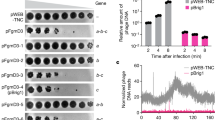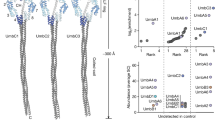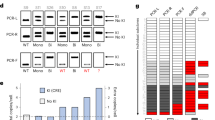Abstract
THE “host shut-off” function of T7 phage has been thought to result from an inhibition of the host Escherichia coli RNA polymerase, which transcribes host RNA and T7 early mRNA, by an early T7 protein presumably the product of gene 0.7, or the “host shut-off” gene1–4. When T7 infection proceeds, early mRNA synthesis is shut off and the T7-specific RNA polymerase5, the product of an early gene of T7 (gene 1), transcribes late mRNA. Thus, “host shut-off” is another control factor involved in the early–late switch of T7 gene expression in addition to the switch of two RNA polymerases from the host to the phage-coded enzyme transcribing early mRNA and late mRNA, respectively, at different times of infection3.
This is a preview of subscription content, access via your institution
Access options
Subscribe to this journal
Receive 51 print issues and online access
$199.00 per year
only $3.90 per issue
Buy this article
- Purchase on Springer Link
- Instant access to full article PDF
Prices may be subject to local taxes which are calculated during checkout
Similar content being viewed by others
References
Brunovskis, I., and Summers, W. C., Virology, 45, 224–231 (1971).
Brunovskis, I., and Summers, W. C., Virology, 50, 322–327 (1972).
Studier, F. W., Science, 176, 367–376 (1972).
Rothman-Denes, L. B., Mathukrishnan, S., Haselkorn, R., and Studier, F. W., in Virus Research (edit. by Fox, C. F., and Robinson, W. S.), 227–239 (Academic, New York, 1973).
Chamberlin, M., McGrath, J., and Waskell, L., Nature, 228, 227–231 (1970).
Hesselbach, B. A., Yamada, Y., and Nakada, D., Nature, 252, 71–74 (1974).
Burgess, R. R., J. biol. Chem., 244, 6160–6167 (1969).
Hinkle, D. C., and Chamberlin, M. J., J. molec. Biol., 70, 157–185 (1972).
Ponta, H., Rahmsdorf, H. J., Pai, S. H., Herrlich, P., and Schweiger, M., Molec. gen. Genet., 134, 29–38 (1974).
Studier, F. W., J. molec. Biol., 79, 227–236 (1973).
Simon, M. N., and Studier, F. W., J. molec. Biol., 79, 249–265 (1973).
Ratner, D., J. molec. Biol., 88, 373–383 (1974).
Studier, F. W., J. molec. Biol., 94, 283–295 (1975).
Lowry, O. H., Rosebrough, N. J., Farr, A. L., and Randall, R. J., J. biol. Chem., 193, 265–275 (1951).
Schweiger, M., and Gold, L. M., Proc. natn. Acad. Sci. U.S.A., 63, 1351–1358 (1969).
Laemmli, U. K., Nature, 227, 680–685 (1970).
Berg, D., Berrett, K., and Chamberlin, M., Meth. Enzymol., 21, 506–519 (1971).
Author information
Authors and Affiliations
Rights and permissions
About this article
Cite this article
HESSELBACH, B., NAKADA, D. Inactive complex formation between E. coli RNA polymerase and inhibitor protein purified from T7 phage infected cells. Nature 258, 354–357 (1975). https://doi.org/10.1038/258354a0
Received:
Accepted:
Issue Date:
DOI: https://doi.org/10.1038/258354a0
This article is cited by
-
Gene expression in mitochondria and bacteria
Molecular and Cellular Biochemistry (1977)
Comments
By submitting a comment you agree to abide by our Terms and Community Guidelines. If you find something abusive or that does not comply with our terms or guidelines please flag it as inappropriate.



